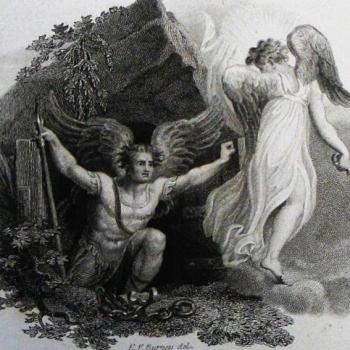 Photo Attribution: “National Art Gallery – Daniel & Den of Lions” by David Ohmer; CC 2.0
Photo Attribution: “National Art Gallery – Daniel & Den of Lions” by David Ohmer; CC 2.0
While liberal “so-called” biblical scholars reject Daniel as legitimate prohecy for different reasons, there are three we should take note of. First, in an unconvincing move they point to three solitary words – lyre, harp, and pipes – as proof positive for the early dating of Daniel. Their argument goes like this: If Daniel had prophesied before the arrival of Alexander the Great, these Greek words would not yet have been normative in the Aramaic of Daniel 3. In actuality this is a poor explanation. In order for this to work one has to approach the text with the presupposition that cultural interchanges between Babylon and Athens could not have existed before the Hellenistic campaigns of Alexander the Great. This idea flies in the face of both historical evidence and common sense. It is a well established historical fact that “Greek culture penetrated the ancient Near East long before the Neo-Babylonian period” (Hanegraaff, Hank, “The Bible Answer Book”).
Additionally, skeptics who deny the supernatural hold that Daniel’s usage of the name “Chaldean” is historically inconsistent. However, this is a far cry from certainty. Since archaeology has discovered the ethnic use of “Chaldean” in eighth-century BC Assyrian records, it is extremely likely that the professional usage of “Chaldean” would in the same way be archaeologically established in sixth-century BC Babylonian records as well.
And third, there is an essential issue – namely that of being closed-minded. Those who deny that Daniel prophesies the “succession of nations, from Babylon in the sixth century to the rise and fall of Antiochus IV Ephiphanes and the abomination that causes delsolation in the second, begin with an antisupernatural bias and thus reject the possibility of prophecy a priori” (Hanegraaff, “The Bible Answer Book”). Instead of keeping an open mind in order to consider both natural and supernatural explanations, these people close their minds and outright reject even the possibility of the latter.
Let’s make no mistake about it.
The reason this liberal view of the Book of Daniel, which rejects it as genuine prophecy even exists, is this: Daniel describes the details around the abomination of desolation so accurately that closed-minded liberal skeptics cannot conceive the idea of this as a prophecy.
I can’t help but be reminded of Nebuchadnezzar, Darius, Cyrus, and Alexander the Great, as all of them were forced to admit that the God of Daniel is indeed “a revealer of mysteries” (Dan. 2:47). Daniel 2:47 and 4:8-9 reflect Nebuchadnezzar’s words that the God of Daniel is the “God of gods.” Daniel 6:26-27 records the confession of Darius. And, to check out the same confessions by Cyrus and Alexander the Great, we look at Josephus’ work “Antiquities” 11:1 and 11:33, respectively.
God clearly revealed to his servant Daniel the future destruction that Antiochus would unleash on the Jews, Jerusalem, and the Jewish Temple (Dan. 7:8, 24-25; 8:23-25; 9:27; 11:29-35; cf. 1 Maccabees 1:54-64). He also showed Daniel that a faithful remnant – a people who know their God – would firmly resist Antiochus (Dan. 11:32). And most important of all, God told Daniel that “the God of heaven will set up a kingdom that will never be destroyed, nor will it be left to another people. It will crush all those kingdoms and bring them to an end, but it will itself endure forever” (Dan. 2:44, NIV-1984).
This was a guest post from Dr. Jeff Hagan.
Jeff is an ordained Christian minister with over 23 years of ministry experience. He has attended Gordon-Conwell Theological Seminary, Luther Rice Seminary, Tyndale Seminary and a handful of other institutes as well. He has earned several degrees including the Doctor of Christian Education and the Doctor of Theology.













